MOCCA 2014 – Speakers
Christos Athanasiadis
University of Athens (Greece)
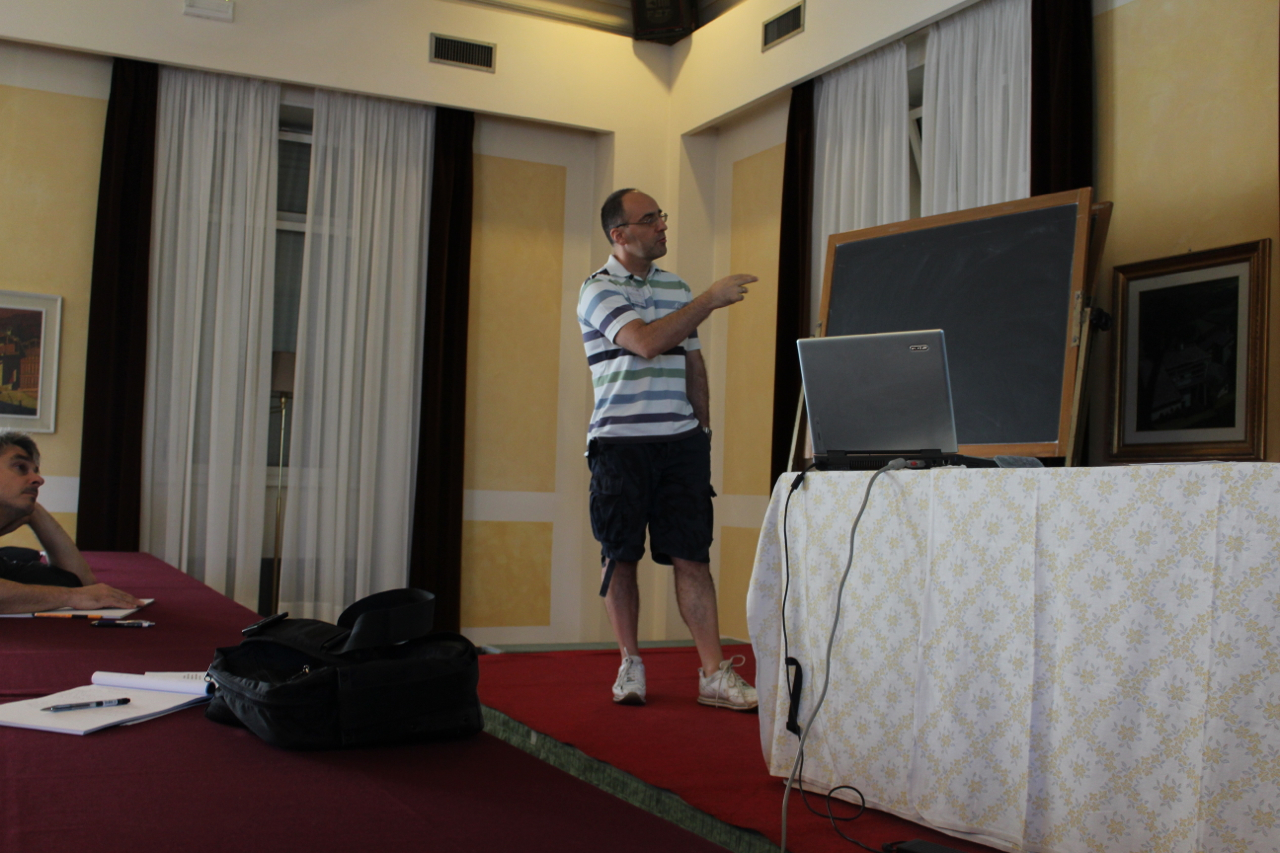
Combinatorics of subdivisions and local h-vectors
The enumerative theory of simplicial subdivisions (triangulations) of simplicial complexes was developed by Stanley in order to understand the effect of such subdivisions on an important enumerative invariant of a simplicial complex, namely the \(h\)-vector. A key role in the theory is played by the concept of a local \(h\)-vector. After explaining the basics of the theory, this talk will survey some recent applications and extensions to subdivisions of flag simplicial spheres and will discuss examples involving constructions of interest in combinatorial commutative algebra.
Christine Berkesch Zamaere
University of Minnesota, Minneapolis (USA)
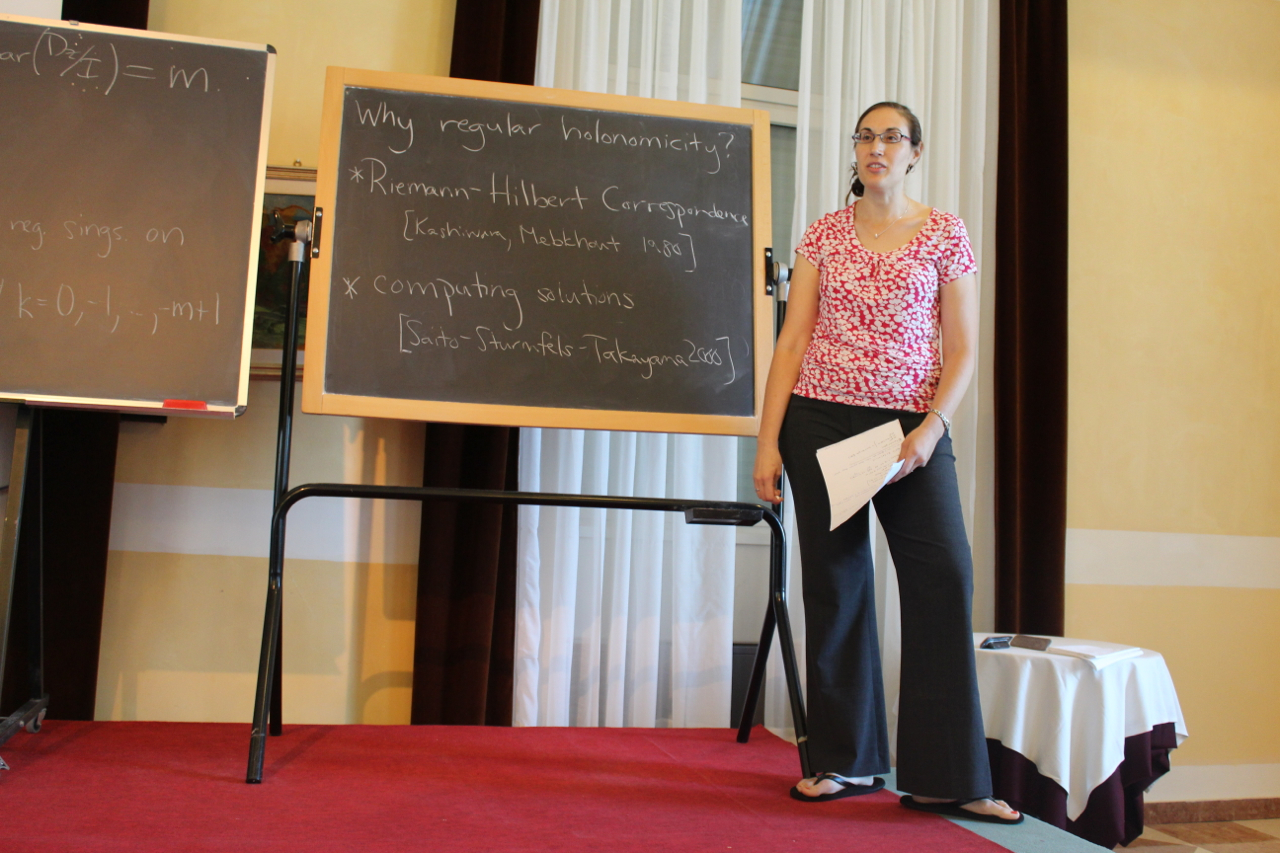
Torus invariants and binomial D-modules
Binomial \(D\)-modules are given by a binomial ideal and homogeneity operators. Combinatorial tools from toric geometry have been successful at analyzing many aspects of binomial \(D\)-modules, which carry a torus action. We will consider how to interpret taking invariants of \(D\)-modules with torus actions, with the goal of gaining a new understanding of the classical hypergeometric systems studied by, among others, Gauss, Appell, and Lauricella. This is joint work with Laura Felicia Matusevich and Uli Walther.
Adam Boocher
University of Edinburgh (UK)
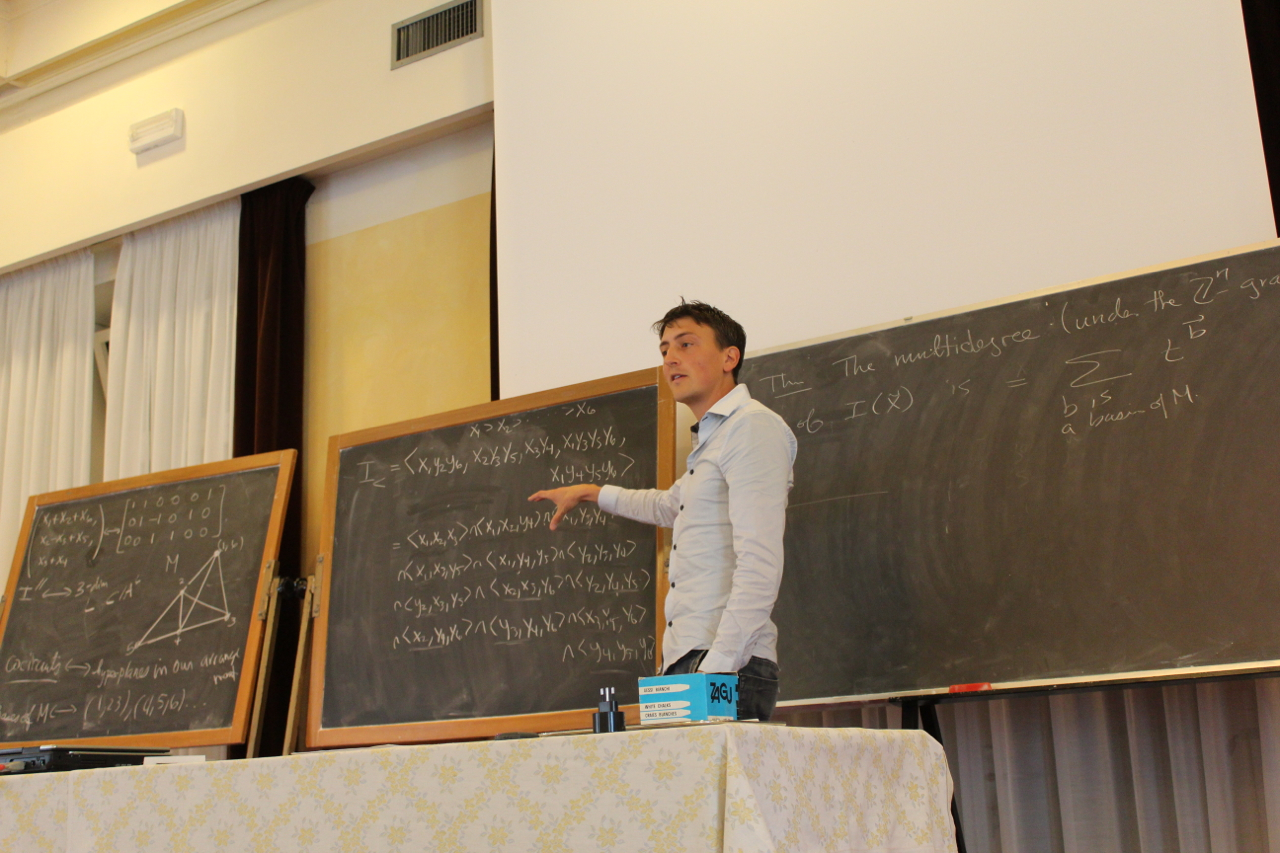
From toric ideals to matroids via Betti numbers
Let \(L\) be an affine linear space. Once we fix coordinates, it makes sense to discuss the closure of \(L\) inside a product of projective lines. In this talk I'll present joint work with Federico Ardila concerning the defining ideal of the closure. It turns out that the combinatorics of this ideal are completely determined by a matroid associated to \(L\) and we are able to explicitly compute many geometric invariants using the language of matroid theory. For example, the closure provides a realization of the matroid of \(L\) in which internal and external basis activity have a natural interpretation. I'll explain how this closure operation comes up naturally (from a toric construction) when one searches for ideals with "nice" behavior upon degeneration.
Holger Brenner
Osnabrück University (Germany)
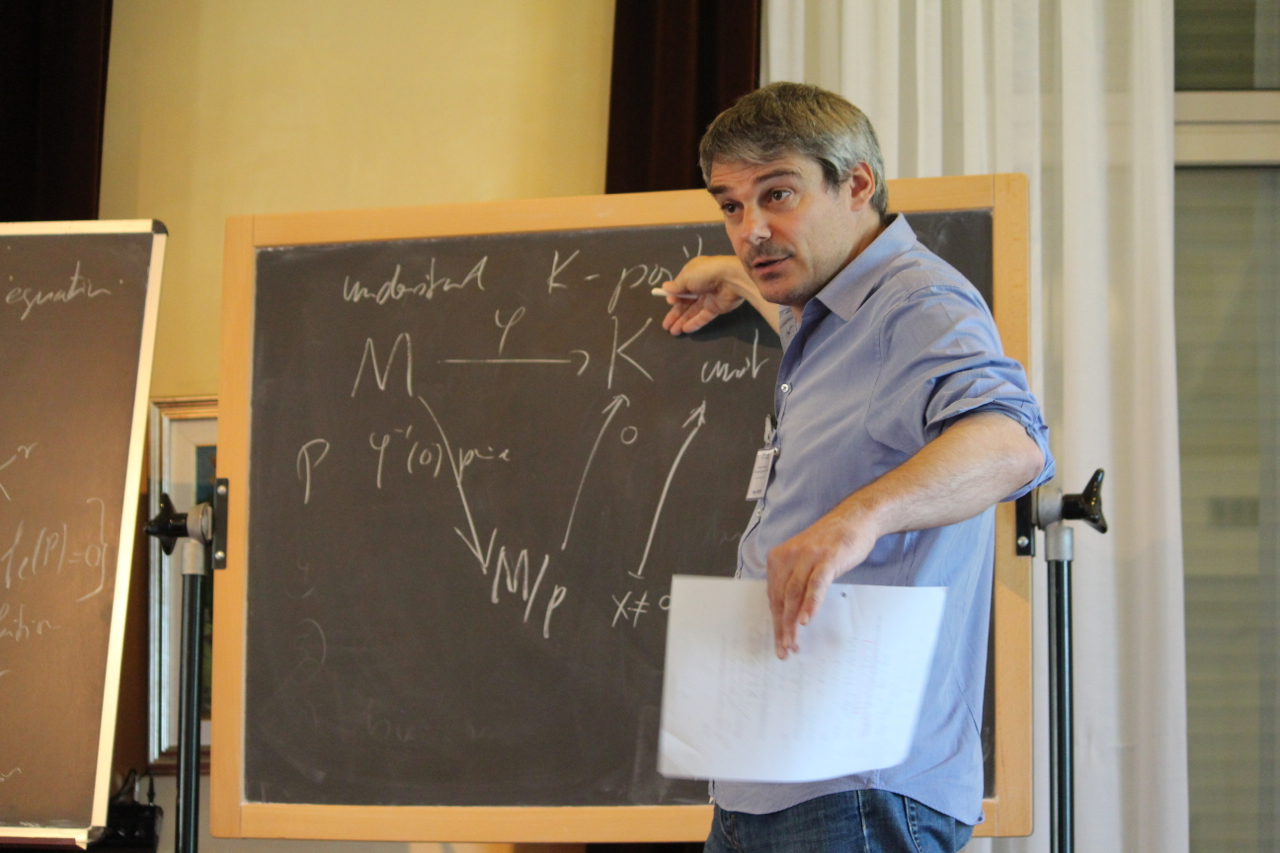
Binoids
We present a basic combinatorial concept called a binoid which gives a natural generalization of monoids and simplicial complexes (monoid rings and Stanley-Reisner rings on the algebraic side). Along with a binoid comes its geometric/topological realization(s), their spectra and \(K\)-Spectra. Inside the framework of binoids we can describe on a combinatorial level basic constructions like killing an ideal, smashing binoids (tensor product), pointed union, N-sets (modules). This concept also allows an infinitesimal combinatorial theory, an application is the rationality of the Hilbert-Kunz multiplicity of a cancellative binoid and their algebras. This is in joint work with S. Böttger and B. Batsukh.
Aldo Conca
Università Genova (Italy)
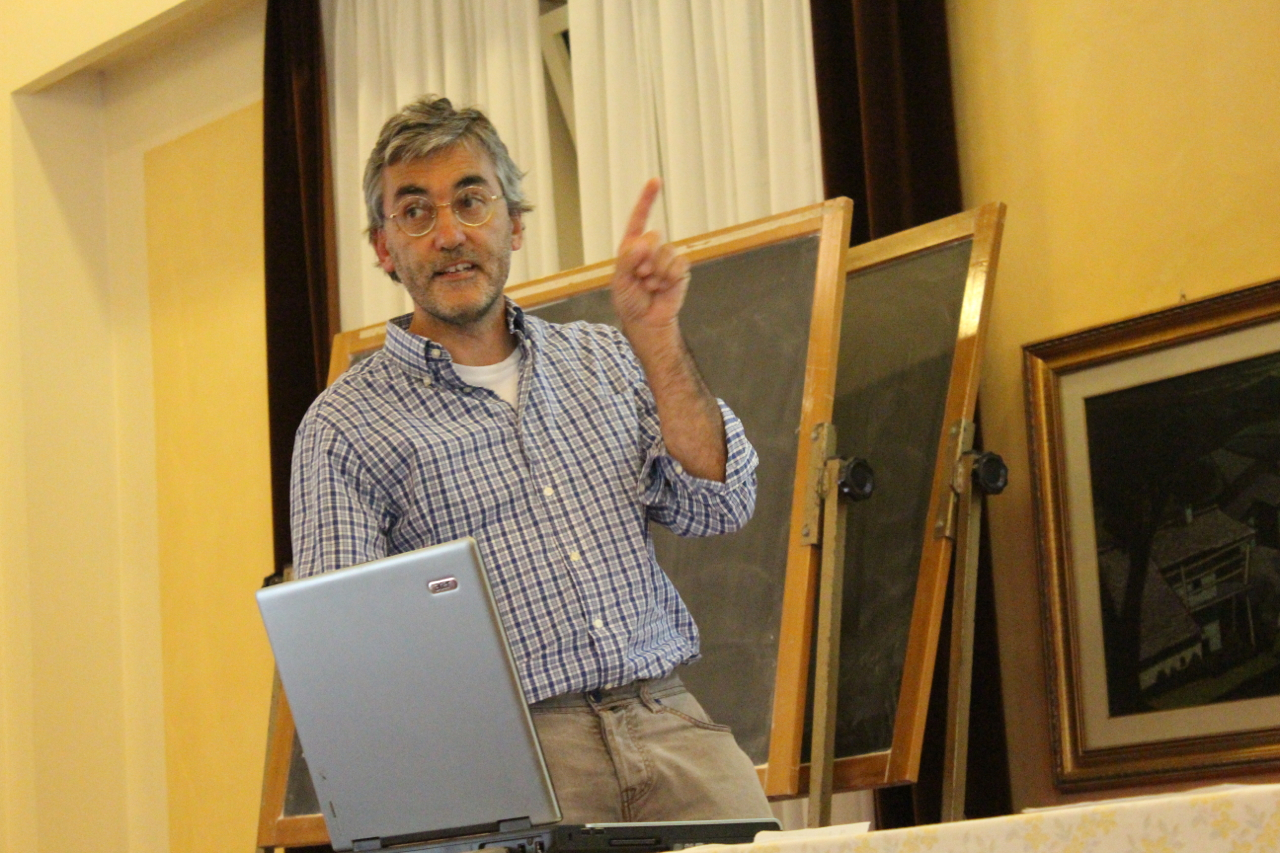
Syzygies of Koszul algebras
The goal of the talk is to present same recent results, obtained jointly with Avramov and Iyengar, on the sub-additivity property of the degrees of the syzygies of Koszul algebras.
Hailong Dao
University of Kansas (USA)
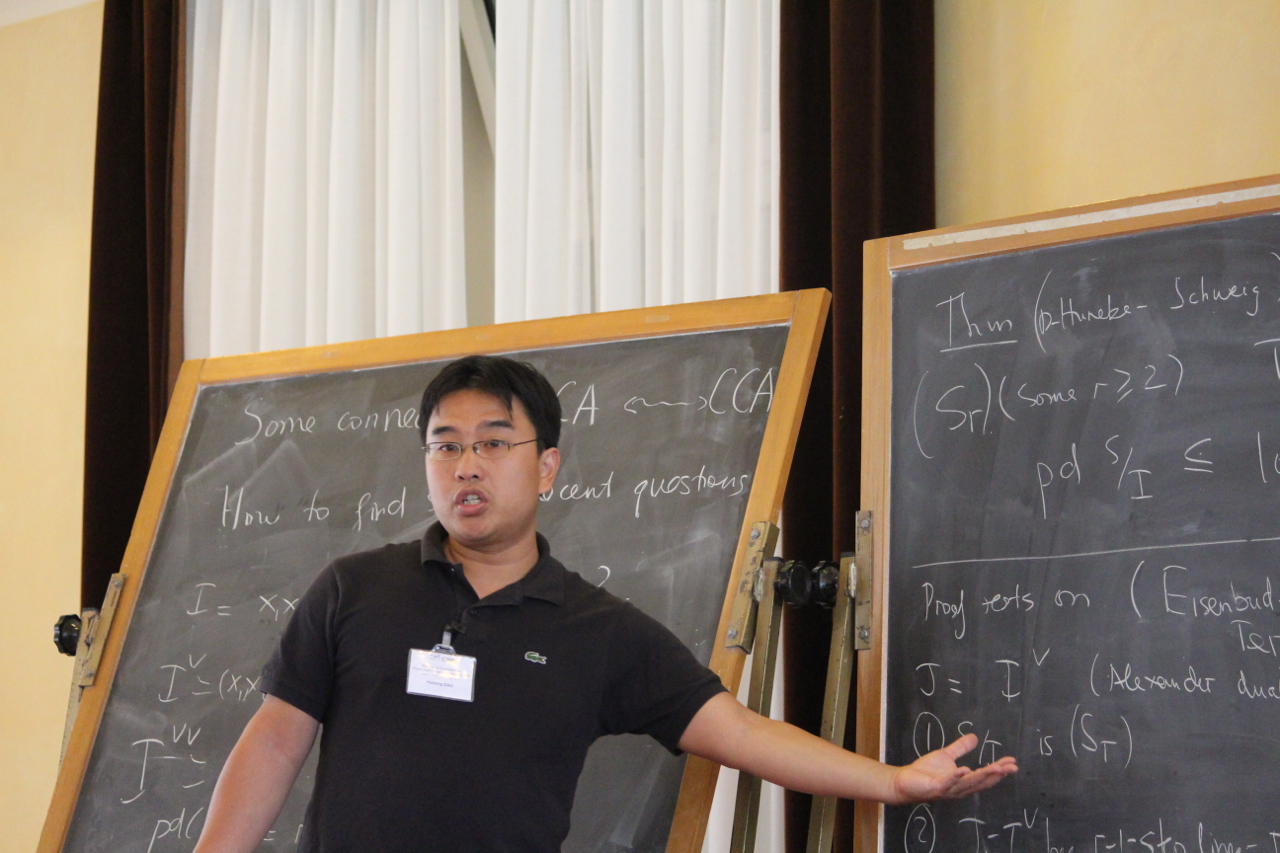
On some new connections between commutative algebra and combinatorial commutative algebra
Recently, a few classical problems in commutative algebra have found interesting interpretation when considered over Stanley-Reisner rings. For example, a very old conjecture by Hartshorne on triviality of vector bundles of small rank lead to unexpectedly strong bounds on regularity of square-free monomial ideals with 1-step linear resolution. In this talk I will explain such connection and point out many more, including how results in the combinatorial setting sometimes inspired improvements for the classical ones.
Emanuela De Negri
Università Genova (Italy)
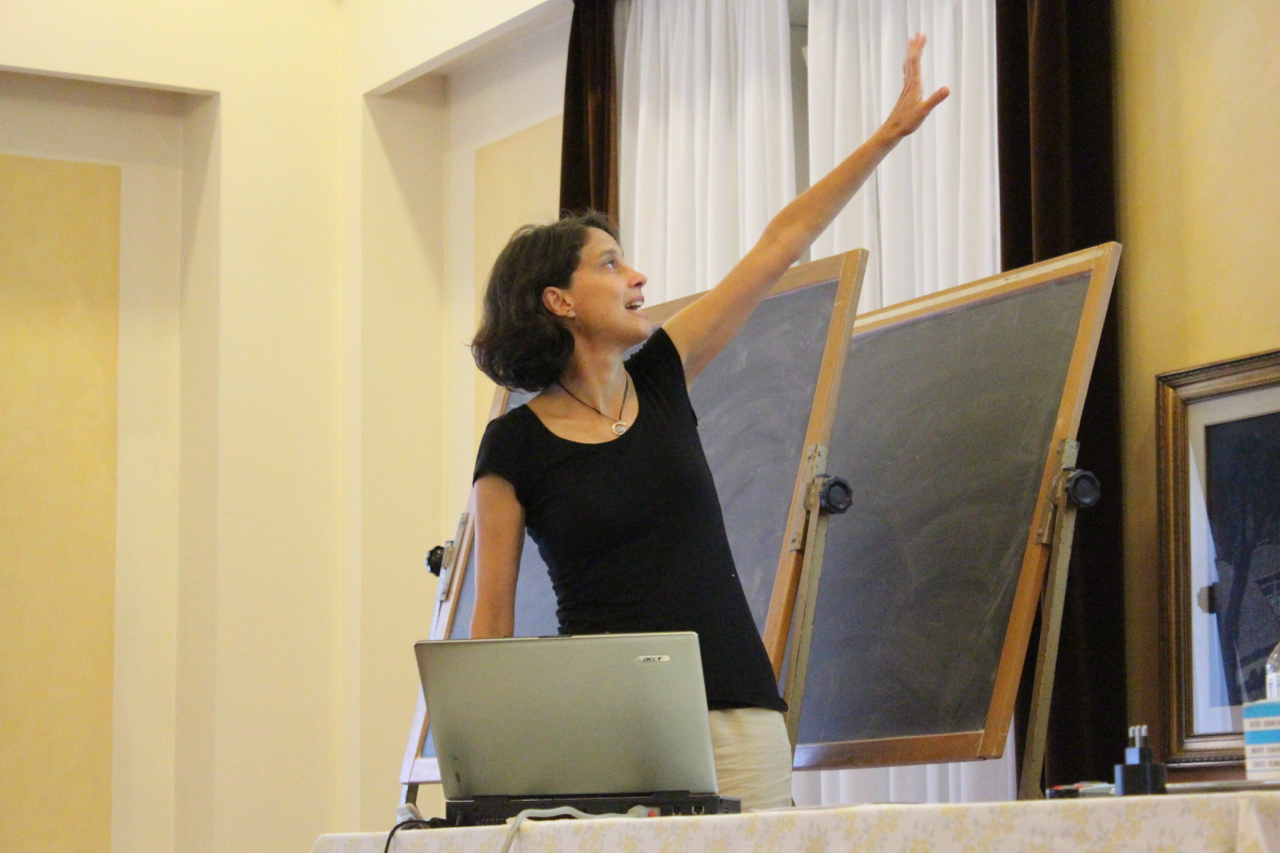
Universal Gröbner bases for maximal minors
Bernstein, Sturmfels and Zelevinsky proved in 1993 that the maximal minors of a matrix of variables form a universal Gröbner basis of the ideal they generate. In the talk a very short proof of this result is presented, based on a specialization argument. Moreover a generalization is given, to matrices of linear forms satisfying certain homogeneity conditions. Main tool is a rigidity statement for radical Borel fixed ideals in multigraded polynomial rings.
This is a joint work with A.Conca and E.Gorla.
Emilie Dufresne
Durham University (UK)
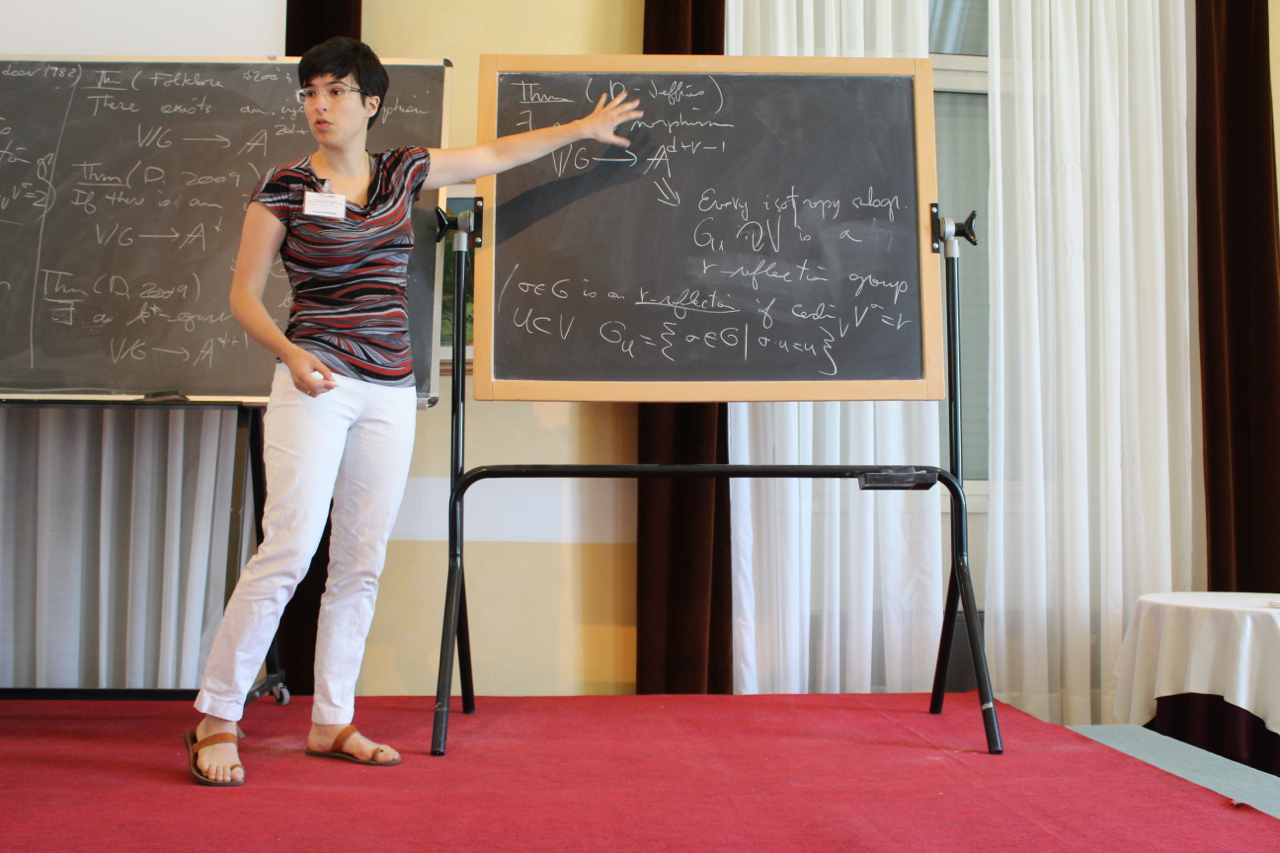
Separating invariants and local cohomology
The study of separating invariants is a new trend in Invariant Theory and a return to its roots: invariants as a classification tool. For a finite group acting linearly on a vector space, a separating set is simply a set of invariants whose elements separate the orbits of the action. Such a set need not generate the ring of invariants. In this talk, we give lower bounds on the size of separating sets based on the geometry of the action. These results are obtained via the study of the local cohomology with support at an arrangement of linear subspaces naturally arising from the action.
(Joint with Jack Jeffries).
Alex Fink
Queen Mary University of London (UK)
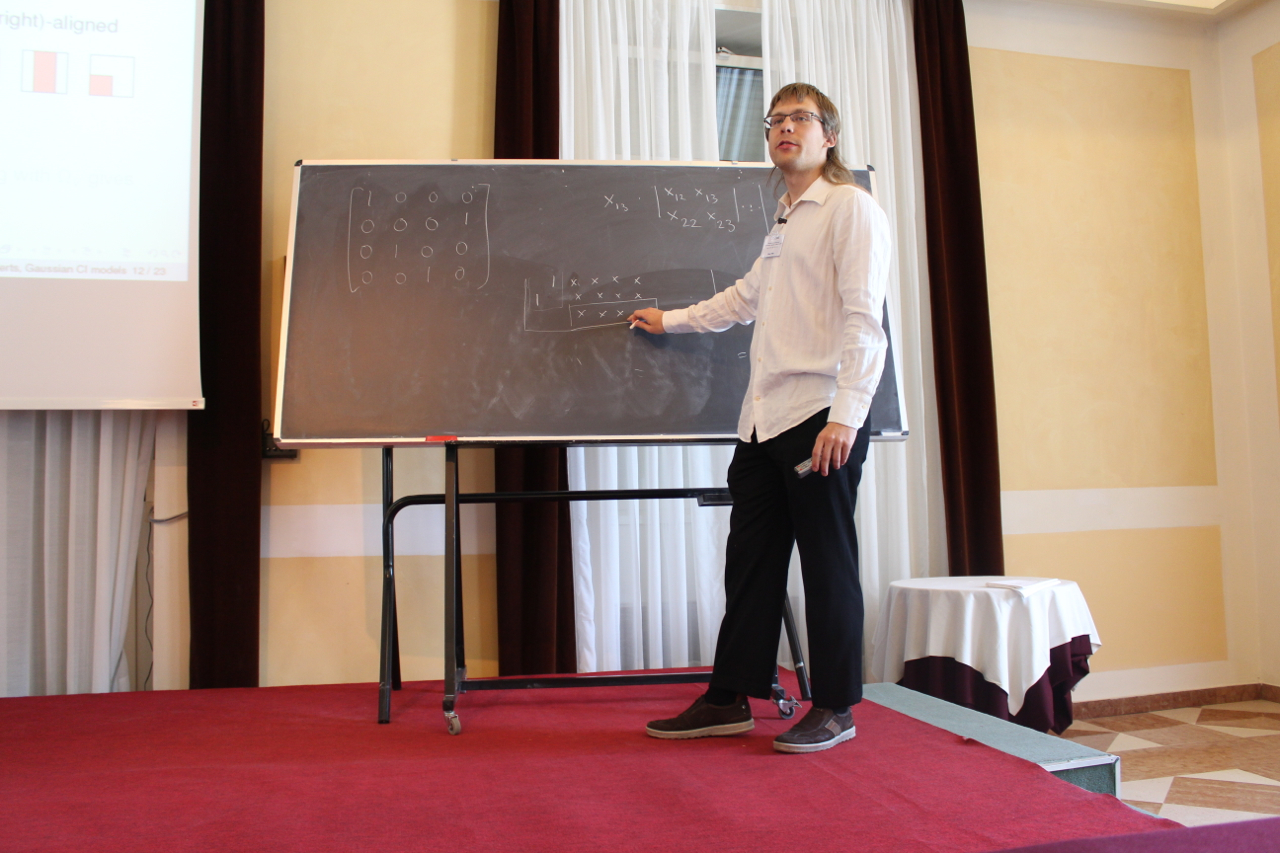
Frobenius splitting of matrix Schubert varieties and Gaussian graphical models
Algebraic statistics builds on the insight that many conditions on random variables that statisticians care about are also familiar to commutative algebraists: for instance, the possible joint distributions of two independent discrete random variables make up the variety of a \(2\times 2\) determinantal ideal.
In this talk we investigate the multivariate Gaussian distribution, and are concerned with whether certain sets of its coordinates are independent, or more generally conditionally independent, of others. We find that in some cases these conditions become analogues of Schubert varieties for symmetric matrices. Using Frobenius splittings, we can characterise components of intersections of these varieties, and thereby answer the question of which independences imply which.
This is joint work with Jenna Rajchgot and Seth Sullivant.
Gunnar Floystad
University of Bergen (Norway)
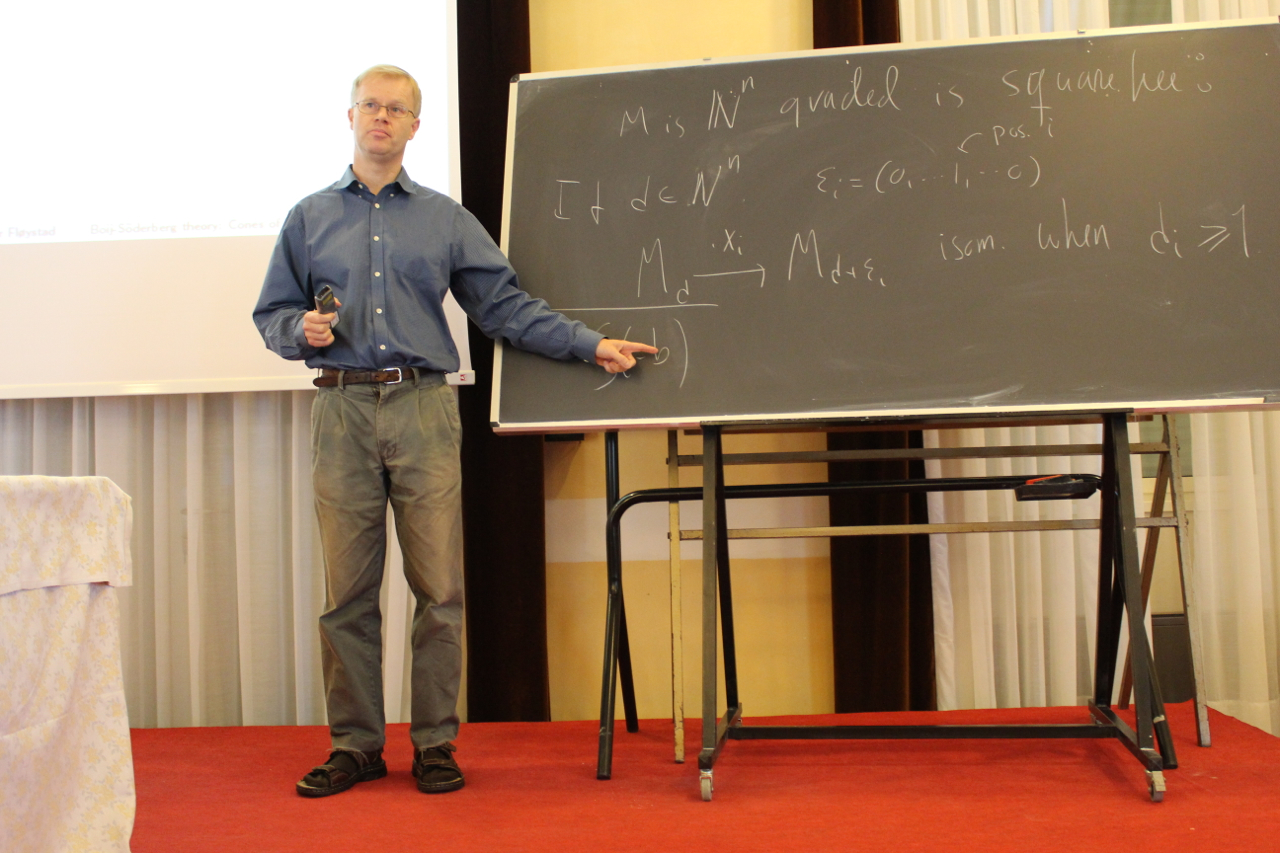
Boij-Söderberg theory: Connecting squarefree modules over polynomial rings and coherent sheaves on projective spaces
Boij-Söderberg theory studies homological invariants of graded modules over polynomial rings, or of coherent sheaves on projective spaces, up to common muliplication of these invariants by a positive rational number. Alternatively phrased, one studies the positive rational cone generated by the homological invariants.
In this talk we consider homological invariants of complexes of squarefree modules over a polynomial ring \(k[x_1, \ldots, x_n]\): Betti numbers, Hilbert functions of homology modules and cohomology modules. These invariants generate a positive rational cone \(C(SqFree, n)\).
We also consider complexes \({\cal F}^\bullet\) of coherent sheaves on projective spaces \({\mathbb P}(W)\) such that all the homology sheaves \(H^i({\cal F}^\bullet)\) are \(1\)-regular and all dual homology sheaves \(H^i({\cal F}^{\bullet \vee})\) are \((n+1)\)-regular. The sheaf cohomology of twists \(H^i({\mathbb P}(W), {\cal F}^\bullet(d))\) of such complexes generate a positive rational cone \(C(coh,n)\).
We show that there is an injection of cones \(C(SqFree,n) \hookrightarrow C(coh,n)\), cojecturally an isomorphism. We also discuss the extremal rays in these cones.
Ines Henriques
University of Sheffield (UK)
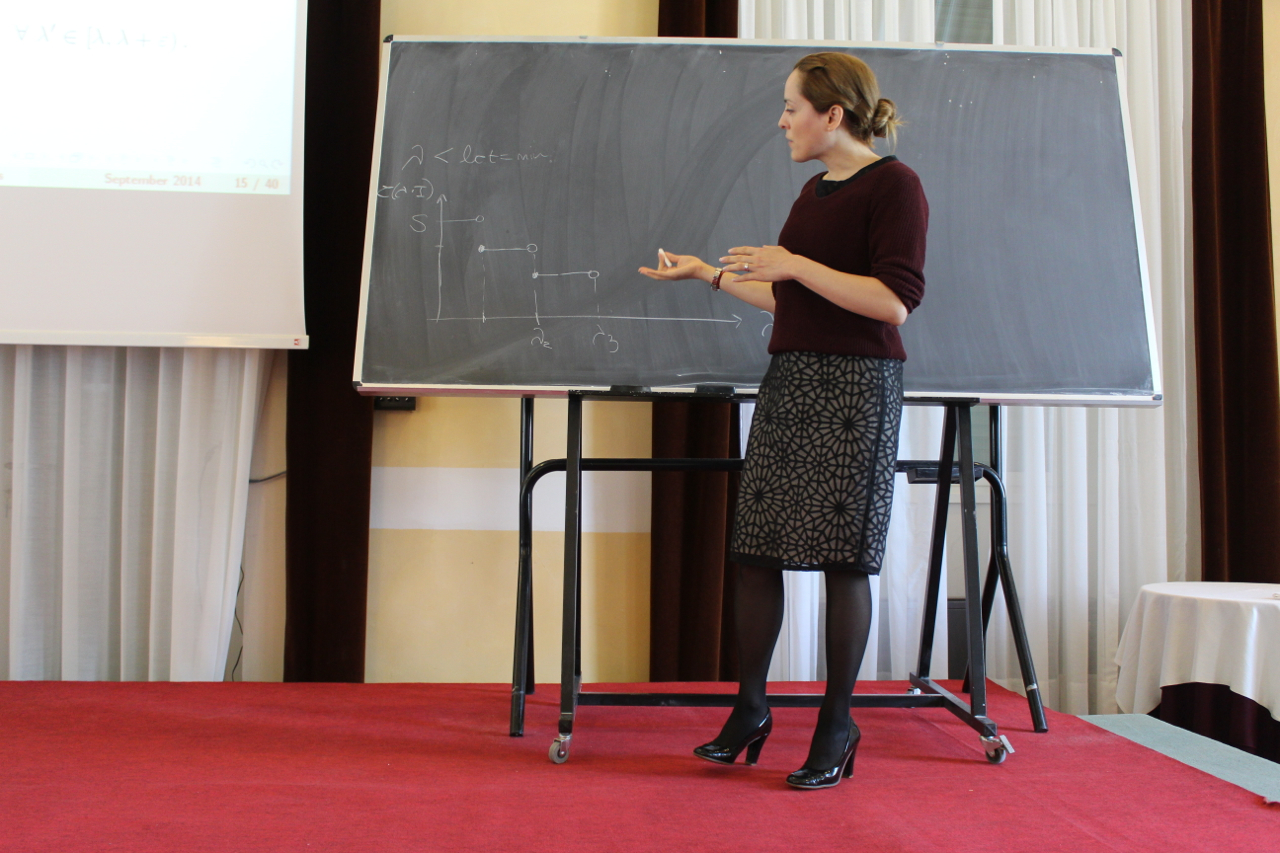
Multiplier, test and Invariant ideals for determinantal objects}
We characterise generalized test ideals and multiplier ideals of classes of determinantal objects, including sums of products of determinantal ideals.
Martina Kubitzke
University of Frankfurt (Germany)
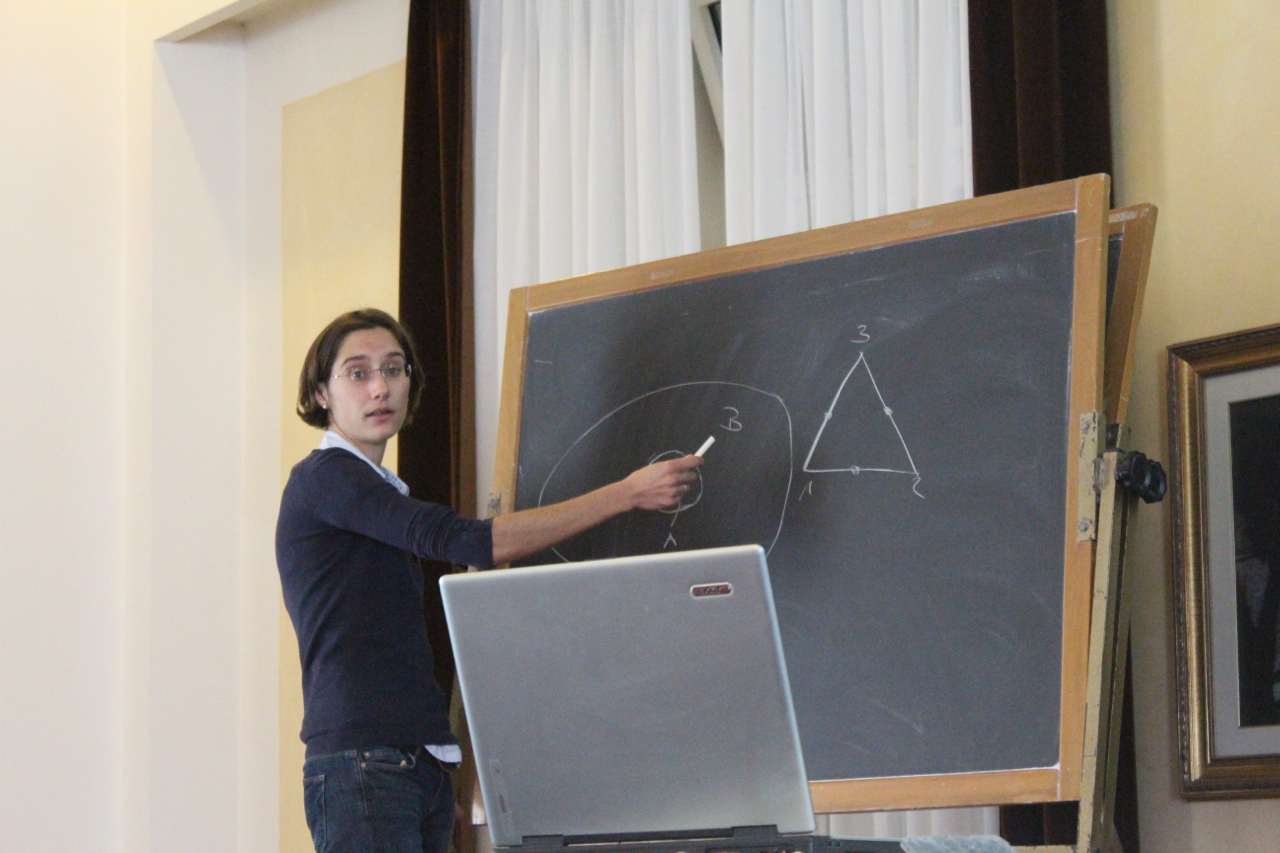
Betti numbers of subdivision operations}
In this talk, we are interested in the graded Betti numbers \(\beta_{i,i+j}\) of the barycentric and the r\textsuperscript{th} edgewise subdivisions of a simplicial complex. One way to compute these numbers is provided by Hochster's formula which expresses them in terms of dimensions of homology groups of induced subcomplexes. Motivated by results of Ein and Lazarsfeld for syzygies of Veronese algebras, we ask the following questions:
Given a fixed shift \(j\), for which \(i\), does \(\beta_{i,i+j}\) not vanish? What can we say about the asymptotic behavior of the Betti numbers of the \(r^\text{th}\) barycentric subdivision \(sd^r(\Delta)\) and the \(r\)th edgewise subdivision \(\Delta^{\langle r\rangle}\) of a simplicial complex \(\Delta\) if \(r\rightarrow \infty\)?
During this talk, we will provide answers to these questions. It turns out that (in almost all cases) the asymptotic behavior of the Betti numbers does only depend on the dimension of the simplicial complex \(\Delta\).
This is joint work with Aldo Conca and Volkmar Welker.
Michal Lason
Jagiellonian University, Krak\'ow (Poland)
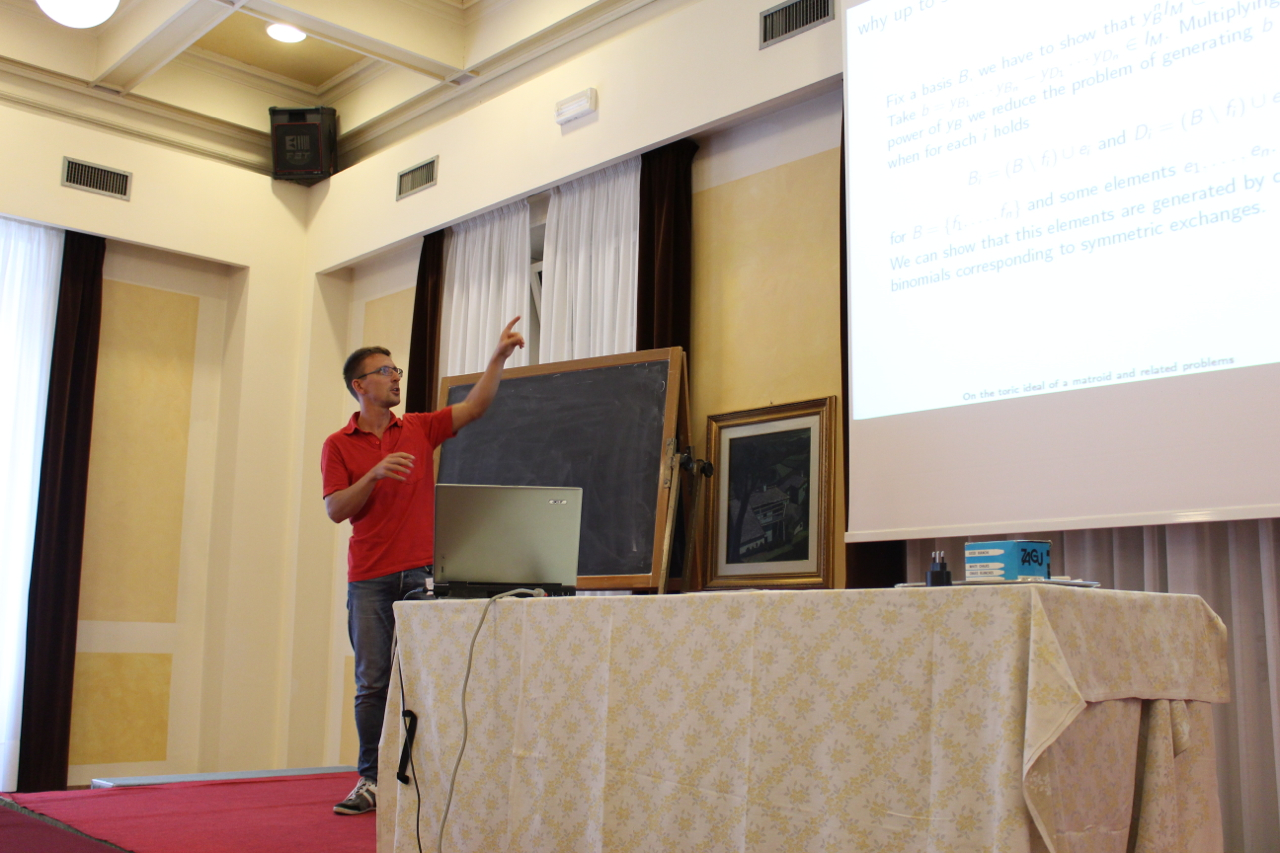
On the toric ideal of a matroid and related problems}
Toric ideals is a certain class of ideals constructed using combinatorial data. When an ideal is defined only by combinatorial means, one expects to have a combinatorial description of its set of generators. An attempt to achieve this description often leads to surprisingly deep combinatorial questions.
White's conjecture is an example. It asserts that the toric ideal associated to a matroid is generated by quadratic binomials corresponding to symmetric exchanges. In the combinatorial language it means that if two multisets of bases of a matroid have equal union (as a multiset), then one can pass between them by a sequence of symmetric exchanges.
White's conjecture resisted numerous attempts since its formulation in 1980. We will discuss our (joint with Mateusz Michalek) recent results on White's conjecture and we will present some related combinatorial problems.
Anton Leykin
Georgia Tech Institute of Technology, Atlanta (USA)
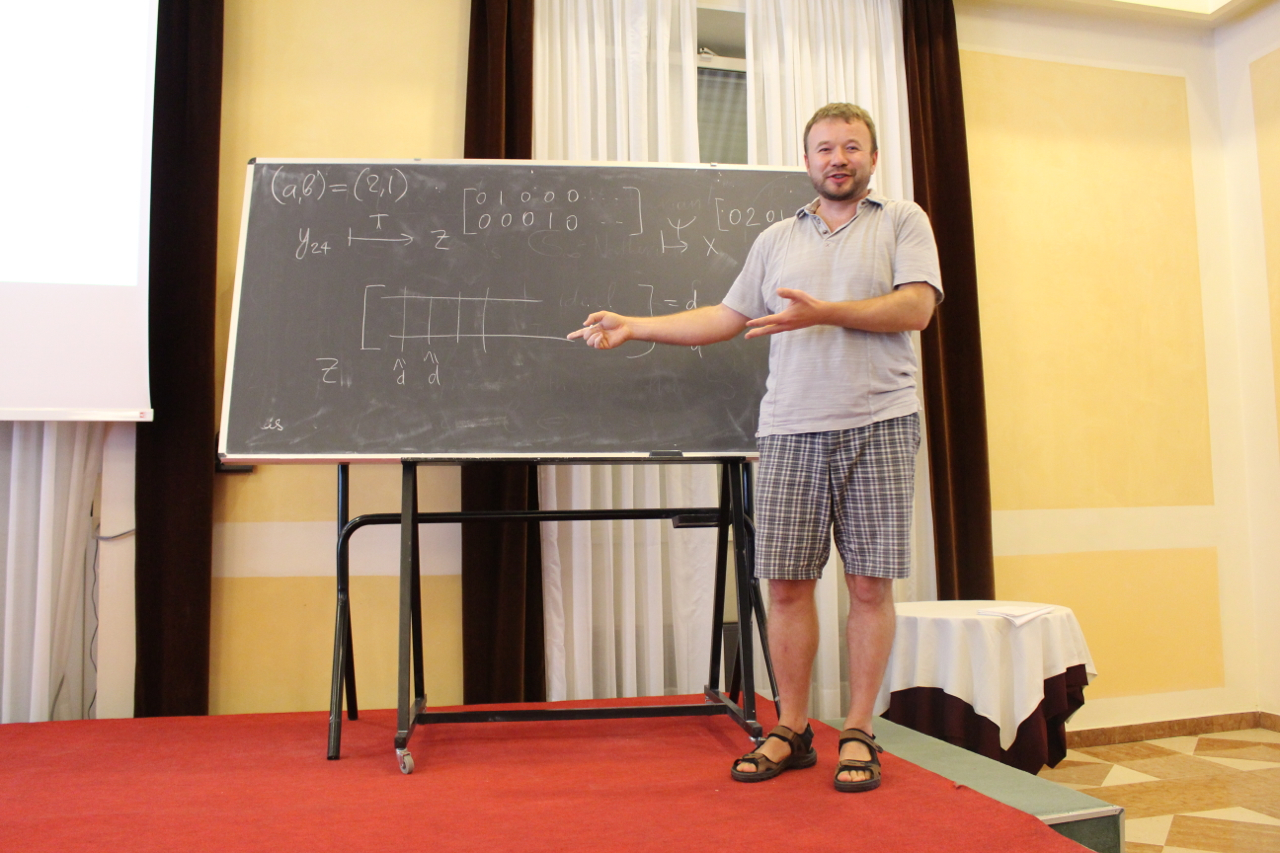
Toric ideals finitely generated up to symmetry}
For a large family of toric ideas we show finite generation up to the action of the infinite symmetric group despite the ambient polynomial rings failing to be equivariantly Noetherian. There exists an algorithm to find a finite set of generators for the kernel of a given equivariant monomial map, moreover, for a smaller family of ideals we can give a recipe for a finite equivariant Markov basis.
(Based on joint works with Draisma, Eggermont, Kahle, and Krone).
Diane Maclagan
University of Warwick (UK)
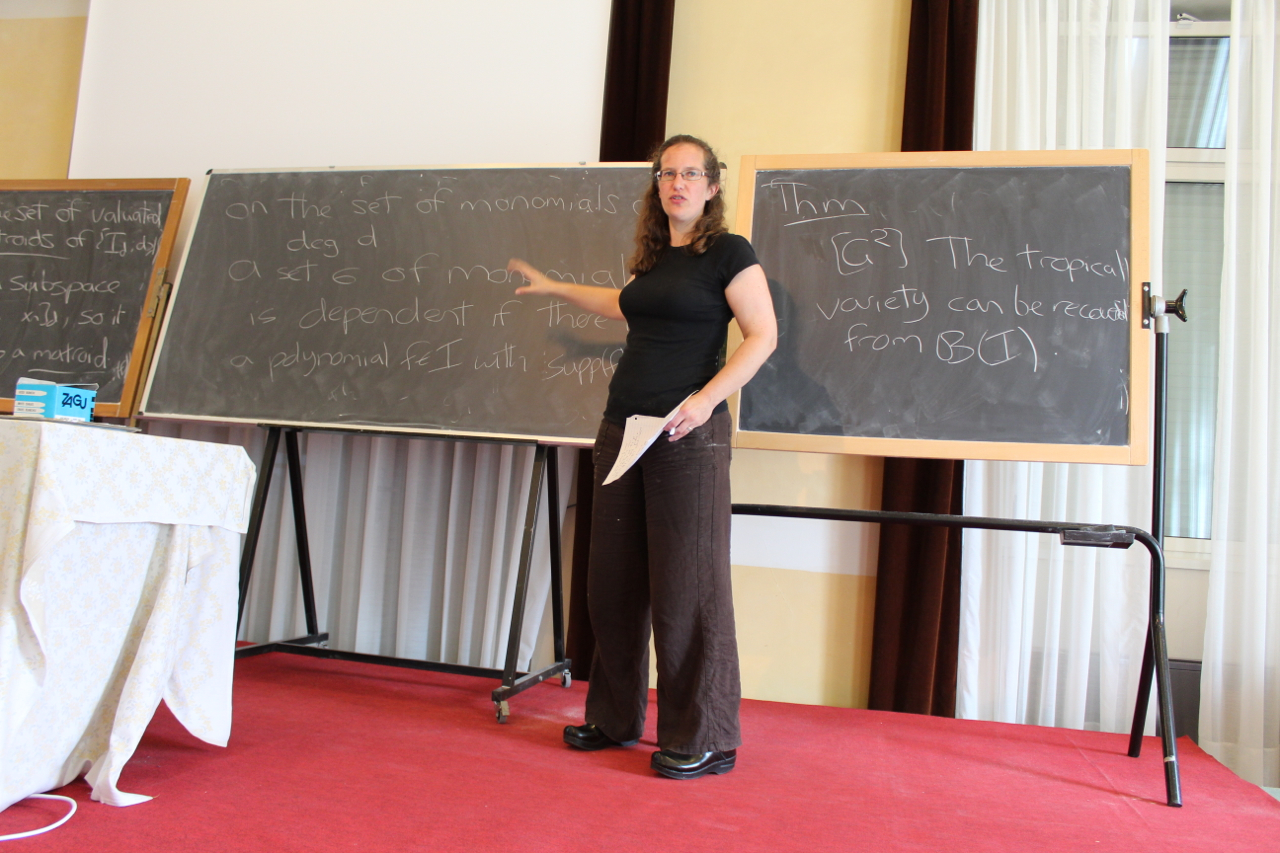
Tropical commutative algebra}
In tropical geometry a polynomial is replaced by a piecewise linear function, called a tropical polynomial. This replaces ideals in a polynomial ring by ideals in the semiring of tropical polynomials. In this talk I will introduce these ideas, discuss Groebner theory in this context, and explain the links to tropical schemes and to the combinatorics of valuated matroids. This is joint work with Felipe Rincon.
Satoshi Murai
Osaka University (Japan)
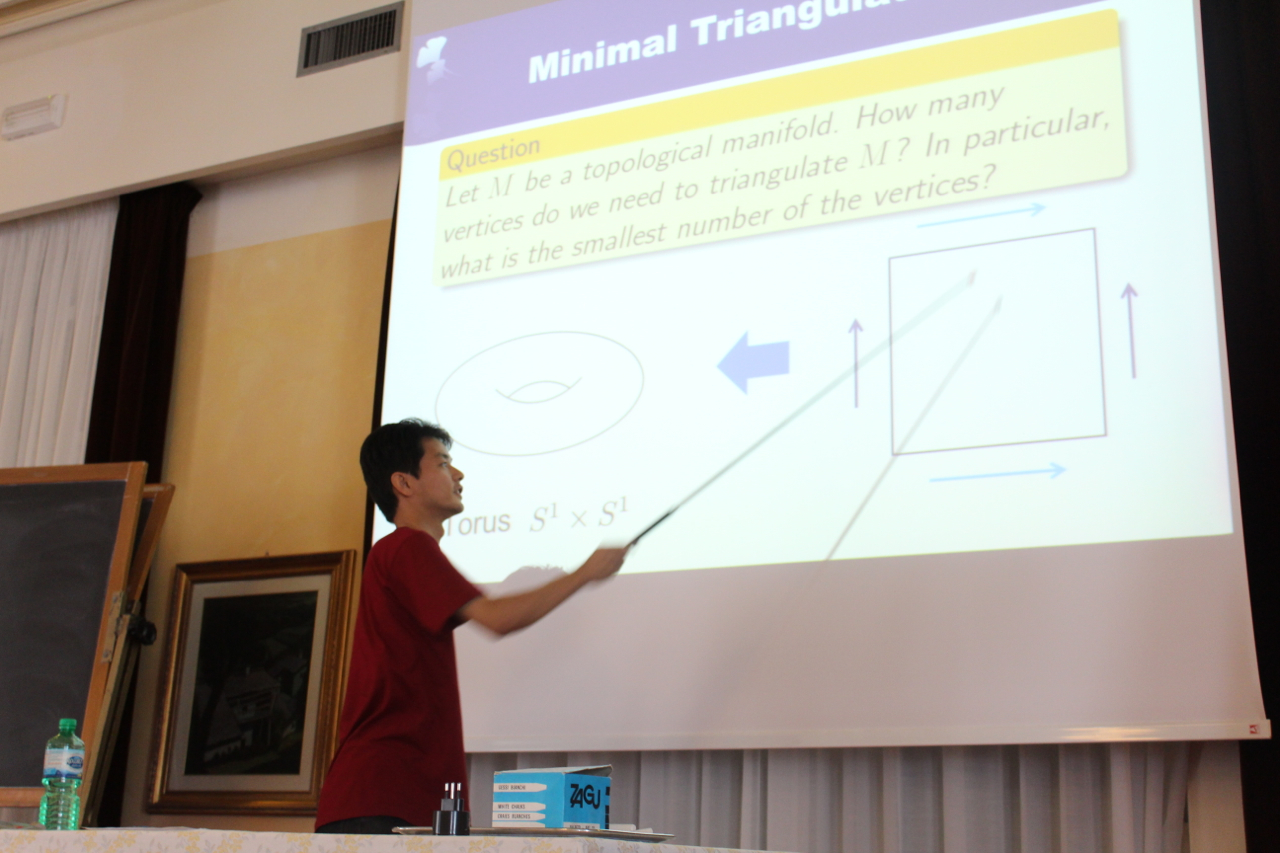
Tight triangulated manifolds and graded Betti numbers
Tightness is an interesting property of simplicial complexes which appears in the study of triangulations of manifolds. In this talk, I will explain a connection between tightness of simplicial complexes and graded Betti numbers, and show some applications of graded Betti numbers to the study of tight triangulated manifolds.
Claudiu Raicu
Princeton University (USA)
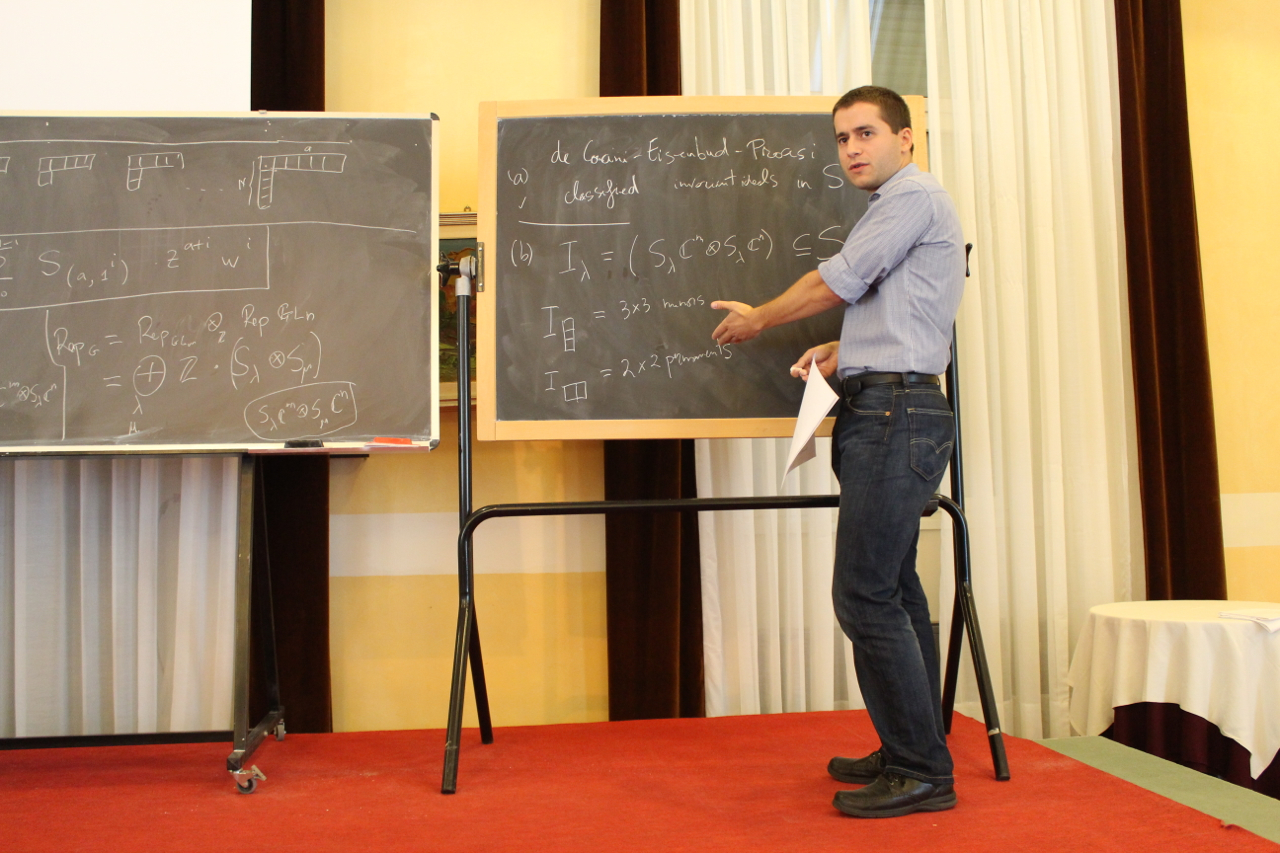
The syzygies of some thickenings of determinantal varieties
The space of \(m \times n\) matrices admits a natural action of the group \(GL_m \times GL_n\) via row and column operations on the matrix entries. The invariant closed subsets are the determinantal varieties defined by (reduced) ideals of minors of the generic \(m \times n\) matrix. The minimal free resolutions for these ideals are well-understood by work of Lascoux and others. There are however many more invariant ideals which are non-reduced, and whose syzygies are quite mysterious. These ideals correspond to nilpotent structures on the determinantal varieties, and they have been completely classified by De Concini, Eisenbud and Procesi. In my talk I will recall the classical description of syzygies of determinantal varieties, and explain how this can be extended to a large collection of their thickenings. Joint work with Jerzy Weyman.
Anurag Singh
University of Utah, Salt Lake City (USA)
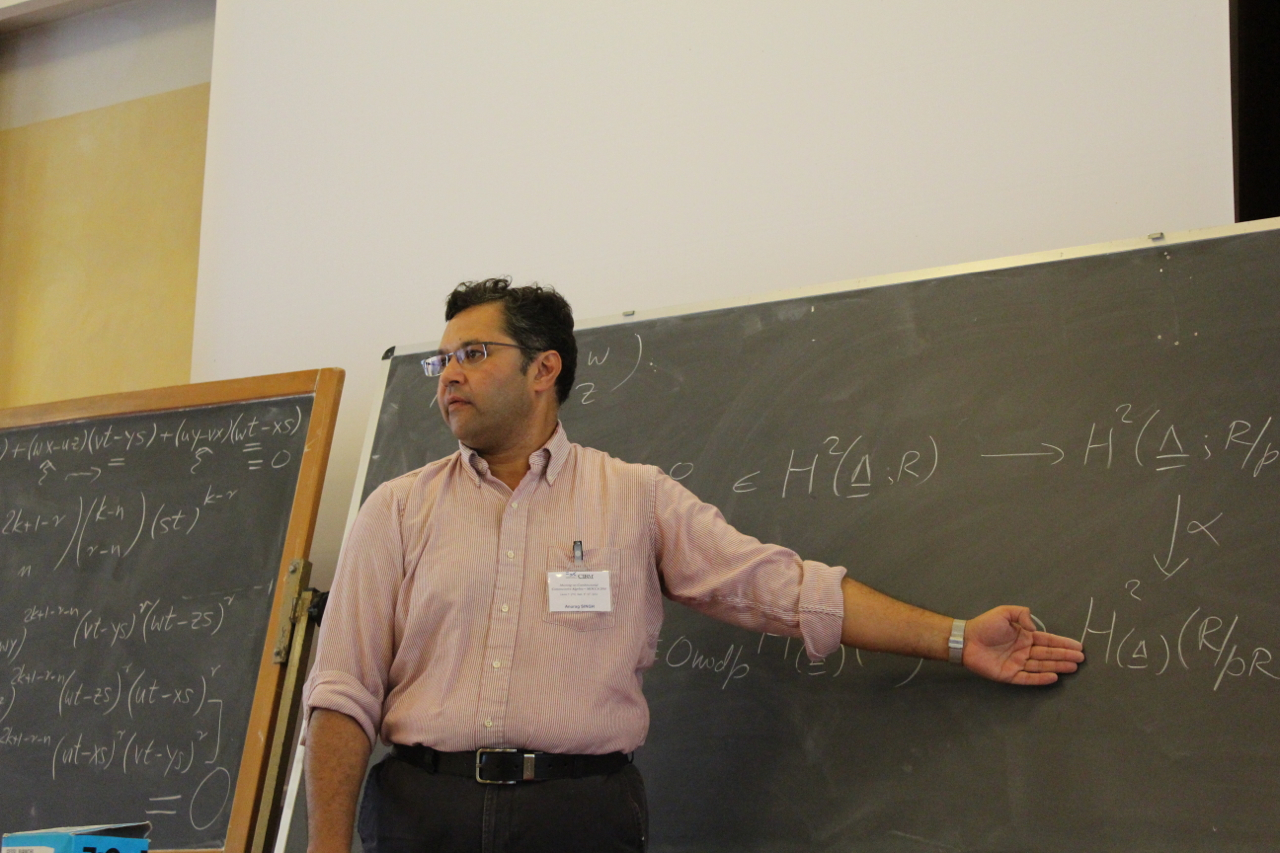
Local cohomology over the integers
We will discuss some recent results on local cohomology modules of rings of polynomials with integer coefficients, obtained by viewing these as modules over rings of differential operators. We will explain how this point of view yields proofs of some polynomial identities constructed previously by ad hoc methods. This is based on joint work with Bhatt, Blickle, Lyubeznik, and Zhang, and with Lyubeznik and Walther.
Peter Symonds
University of Manchester (UK)}
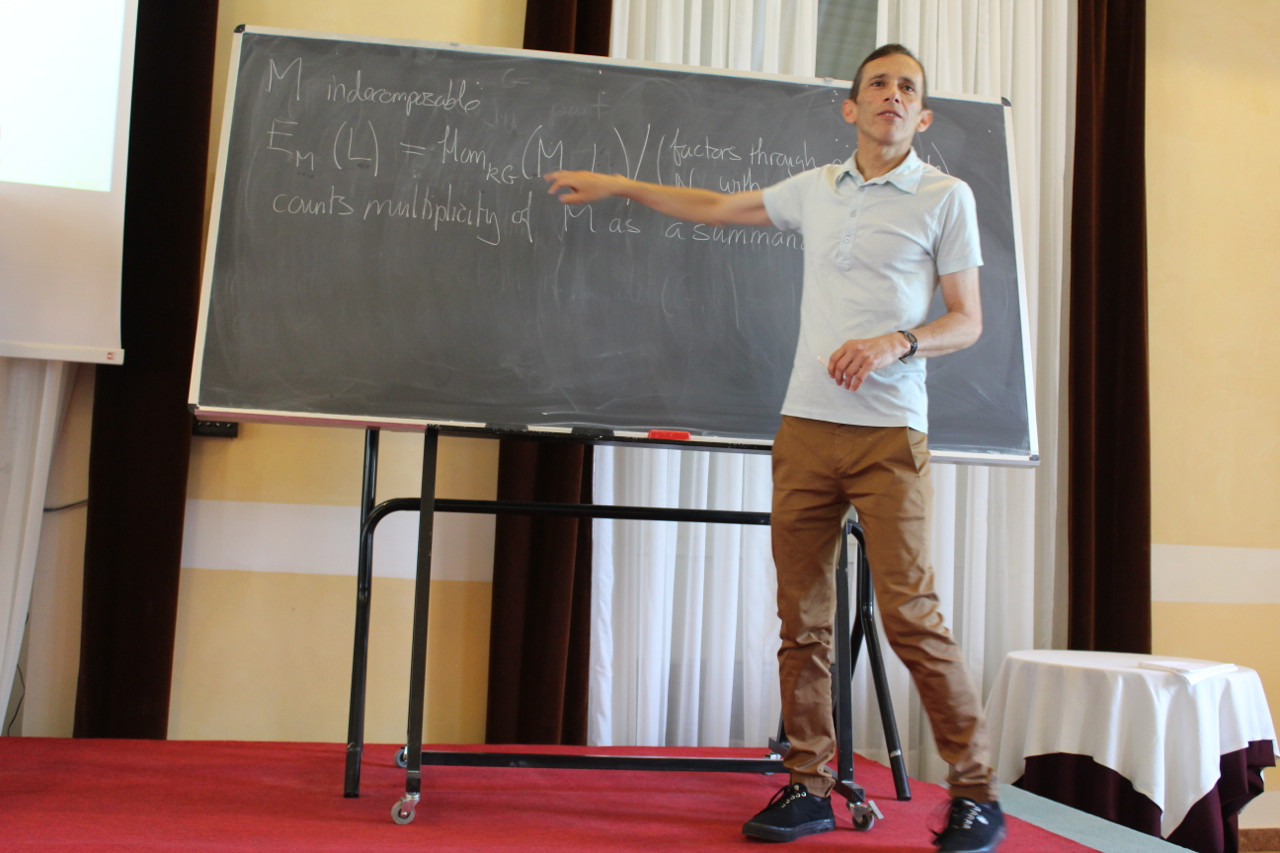
Rings of invariant summands
The ring of polynomial invariants under the action of a finite group enjoys enjoys many good properties in characteristic \(0\); for example, it is Cohen-Macaulay. Many of these fail in characteristic \(p\).
We show that if you only consider the invariants that correspond to trivial summands of \(k[V]\) as a \(kG\)-module, then many of these properties survive.
Kevin Tucker
University of Illinois at Chicago (USA)
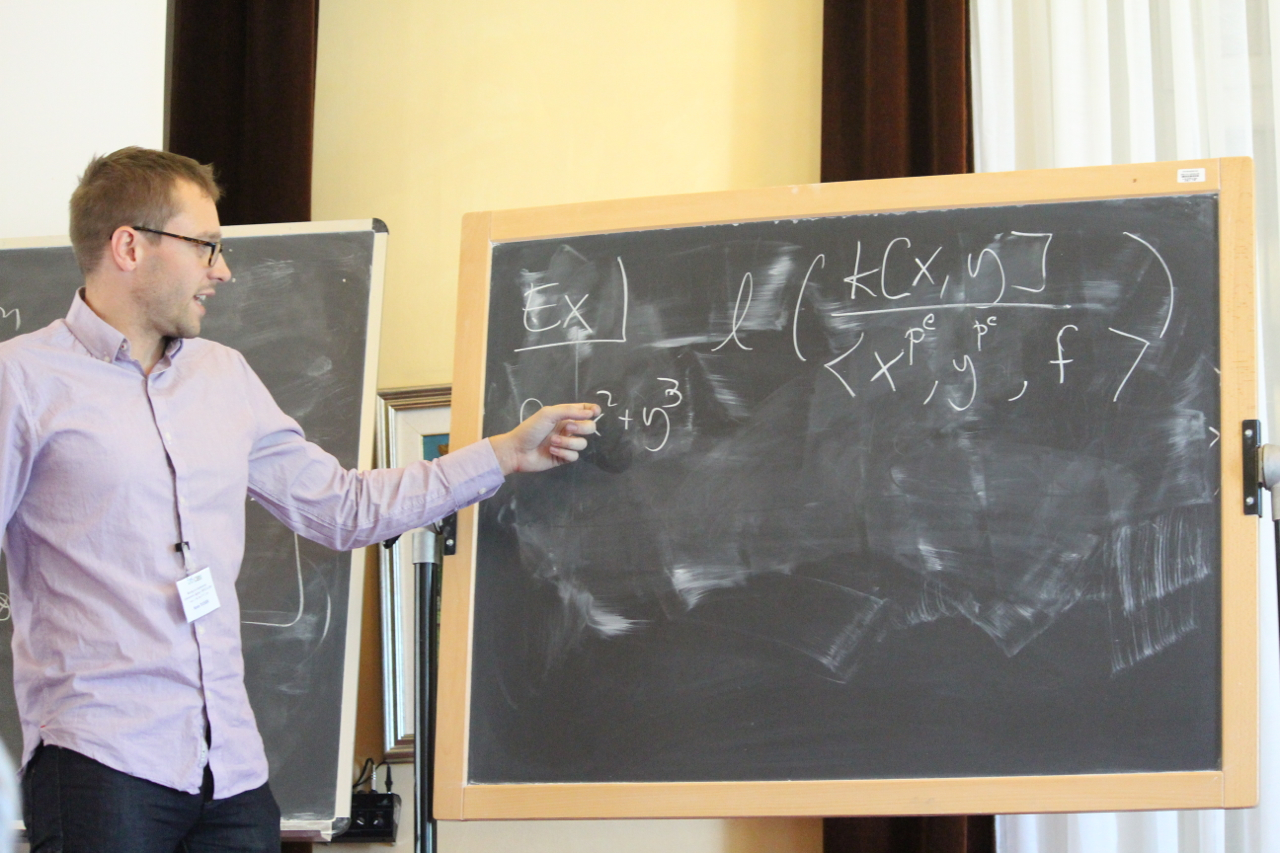
On the limit of the F-signature function in charactetistic zero
The F-signature of a local ring in positive characteristic gives a measure of singularities by analyzing the asymptotic behavior of the number of splittings (F-splittings) of large iterates of the Frobenius endomorphism. One can also incorporate ideal pairs by restricting the set of "allowable" splittings, and varying the coefficient of the ideal gives rise to the F-signature function of the pair. While for each fixed characteristic \(p > 0\) these functions tend to be extremely complicated, in the few examples that have been computed they tend to limit to a piecewise polynomial function as p tends to infinity. In this talk I will discuss what is known about these functions and their limits, and present a number of new computations for diagonal hypersurfaces. The new computations (joint with Shideler) build on the techniques of Han and Monsky used to compute the Hilbert-Kunz multiplicities of diagonal hypersurfaces.
Rafael Villarreal
Centro de Investigacion y de Estudio Avanzados del I.P.N., Mexico (Mexico)
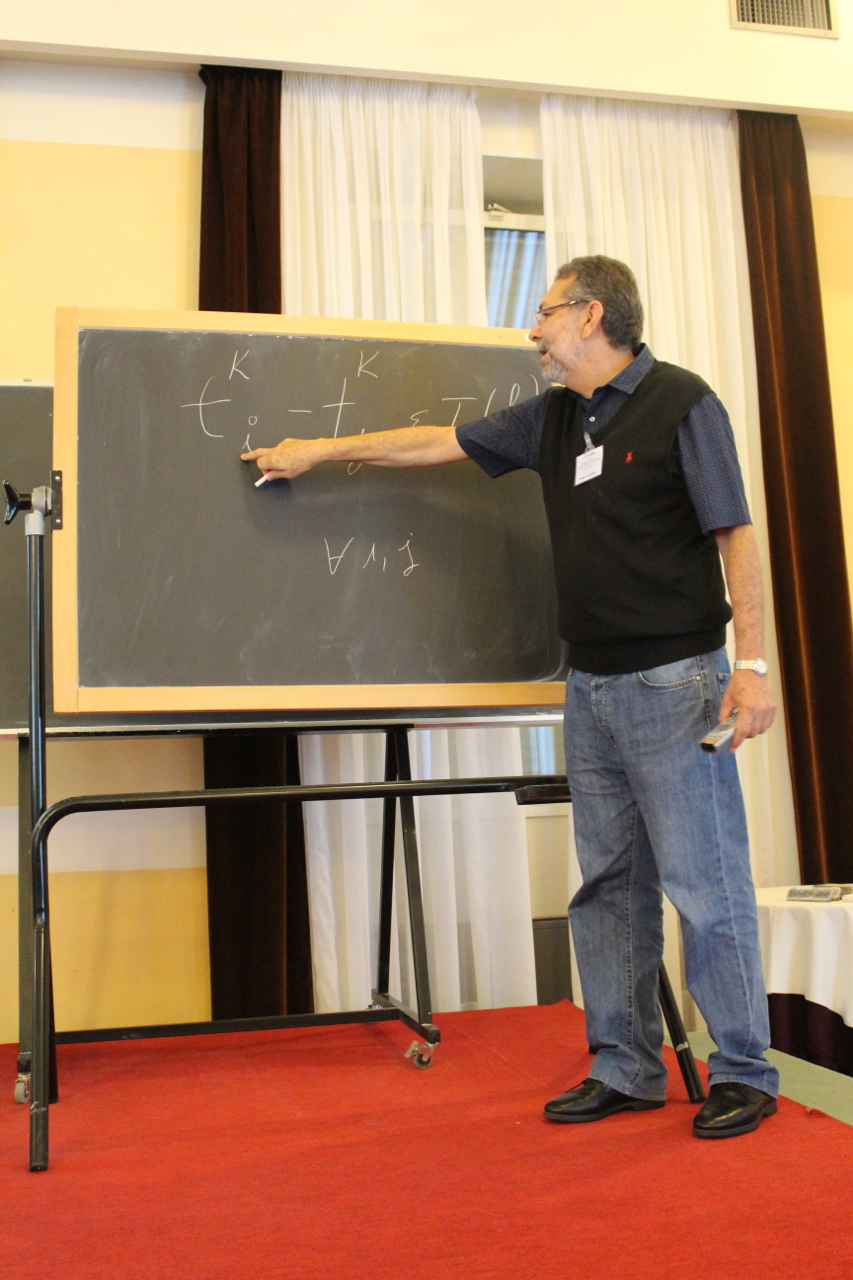
Algebraic properties and invariants of lattice and matrix ideals
We study algebraic properties (complete intersection, primary decomposition) and algebraic invariants (degree, regularity) of lattice and matrix ideals. The main results presented in this talk will apply to graded lattice ideals of dimension \(1\) and to graded vanishing ideals of sets parametrized by monomials over finite fields. Some applications to the theory of \(1\)-dimensional binomial ideals will be given. If \(G\) is a connected graph, it will turn out that the order of its sandpile group is the degree of the Laplacian ideal. This is joint work with Liam O'Carroll, Francesc Planas-Vilanova, Maria Vaz Pinto, Jorge Neves and Hiram L\'opez.
Marius Vladoiu
University of Bucharest (Romania)
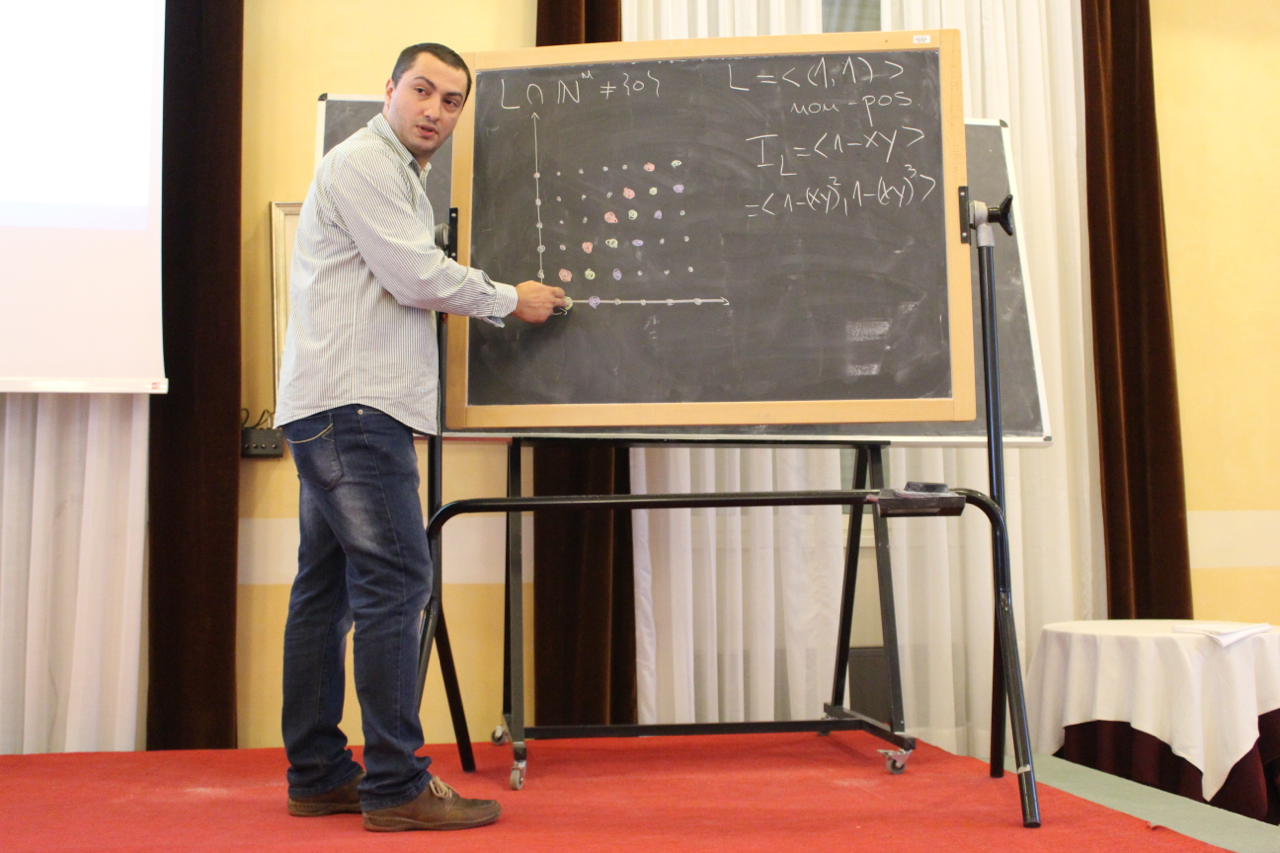
Markov bases of lattice ideals
We describe all possible minimal generating sets of minimal cardinality, that is all Markov bases, for a lattice ideal. As application we obtain the complete classification of the lattices whose lattice ideals are binomial complete intersection. Moreover we discuss algebraic and geometric characterization of the Universal Markov basis (the union of all Markov bases up to a sign) of a toric ideal, and the related Markov complexity. In particular, we compute the Markov complexity for monomial curves in \(A^3\), answering a question posed by Santos and Sturmfels.
Josephine Yu
Georgia Tech, Atlanta (USA)
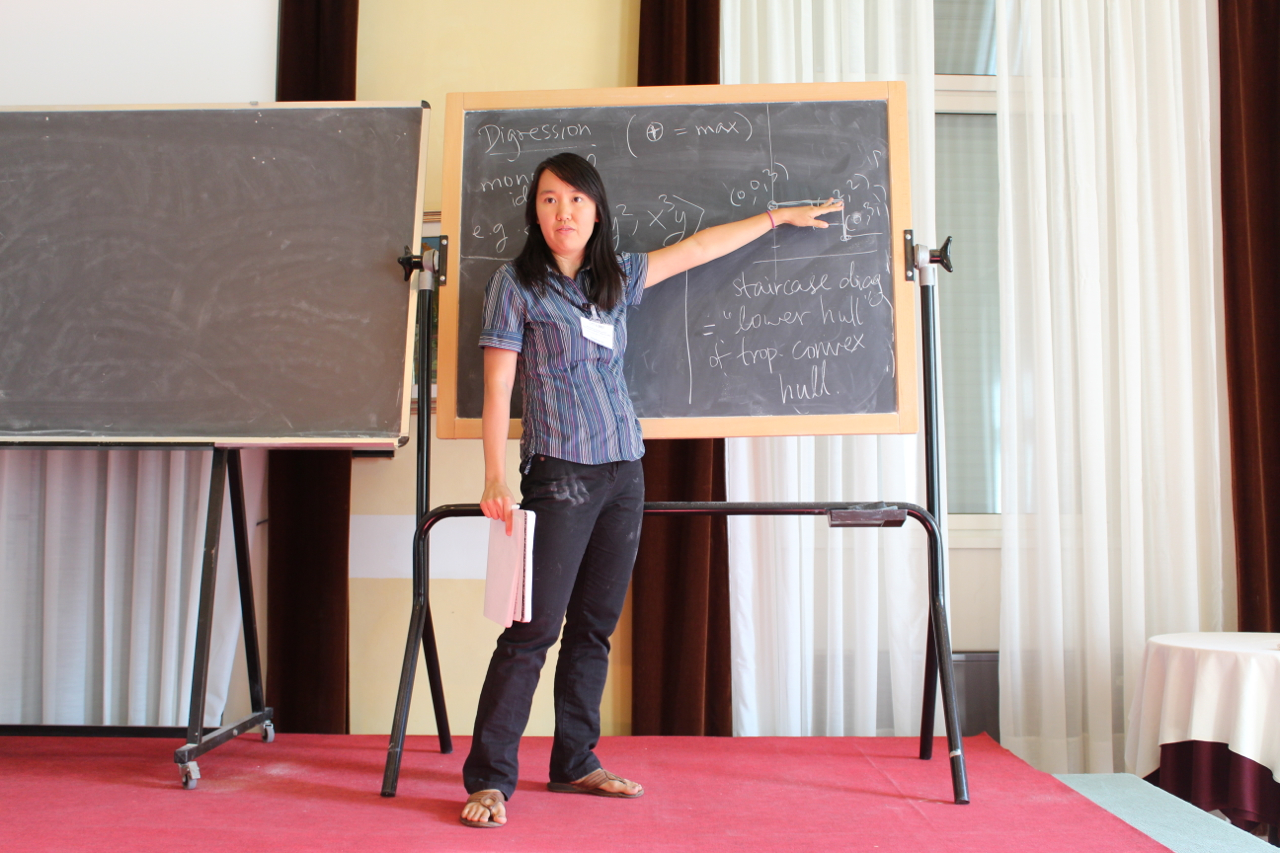
Tropicalizing the positive semidefinite cone
A tropical positive semidefinite matrix is the valuation of a semidefinite matrix over the field of real Puiseux series. The tropical PSD matrices coincides with the normal cone at a vertex of the Newton polytope of the symmetric determinant. We find generators and defining inequalities of the cone. The PSD tropical quadratic forms are those that induce the trivial subdivision on the standard simplex dilated by two. We also show that the tropical PSD cone is the tropical convex hull of the set of symmetric matrices of tropical rank one and that every tropical PSD matrix can be factored as a tropical product of a matrix and its transpose.